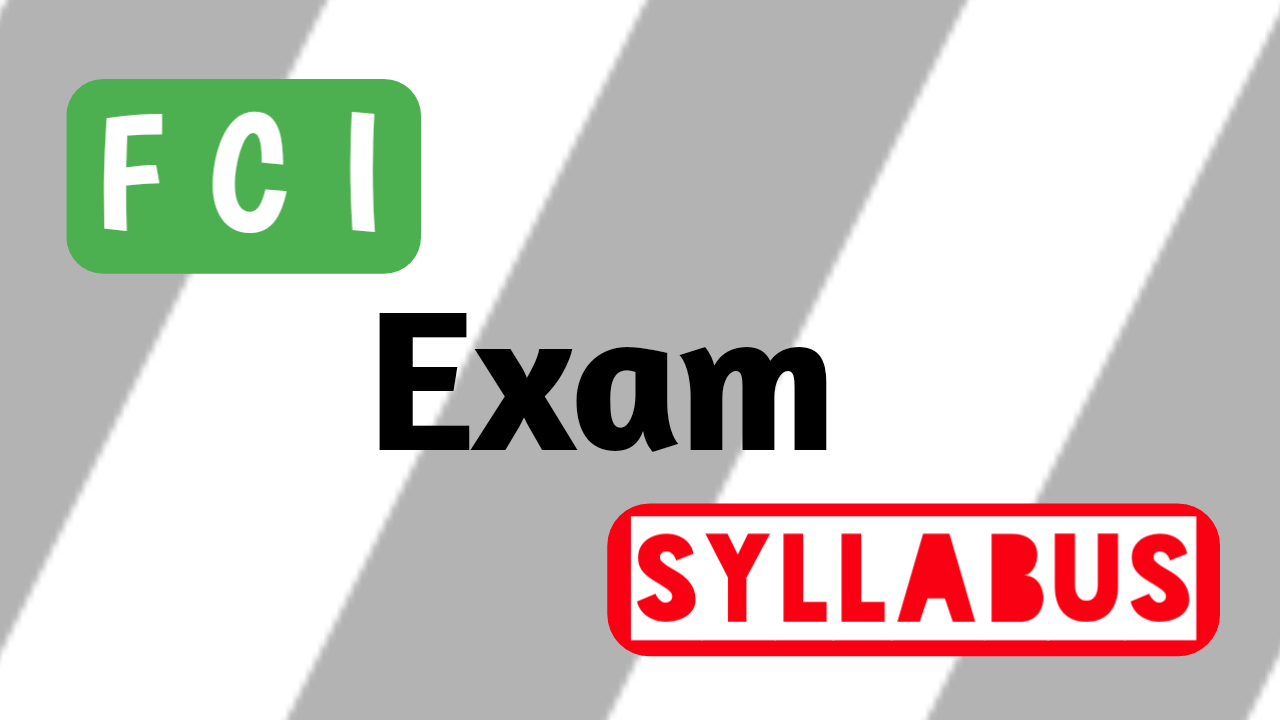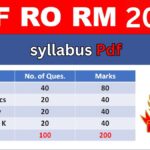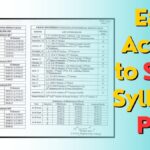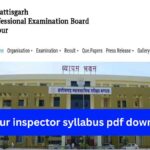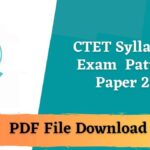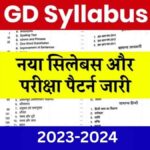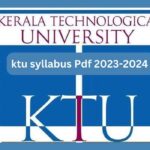Table of Contents
FCI Syllabus –
Are you really interested in FCI ? or you’re looking for FCI Syllabus.
If your answer is Yes, you have come to the place because today I’m going to discuss the FCI Syllabus in detail.
At first, it’s very important to know what exactly FCI is.
FCI is an abbreviation of Food Corporation Of India and it’s a government of India as well.
At the end of the year, it recruits plenty of people for various posts.
In fact, there are lots of posts under FCI and you’re free to choose any of those as per your requirement. I’ve described all of them in a systematic way below.
FCI exam’s notification is published in the month of September or October every year for sundry posts.
But in this, those people are only able to enter, whose preparation is good enough.
Actually, the exam consists of three phases, the first one is Prelims, the second is Mains and the last one is about the Interview process thereby the whole process is completed.
In detail, there’s a discussion about the FCI syllabus or detailed information about all the phases of this exam.
Without spending the time, let’s start.
Before I explain, let me tell you that here you’ll know the FCI exam or FCI manager syllabus.
1. FCI Phase 1 Syllabus ( Prelims ) –
Firstly, I’ll tell you about the FCI Phase 1 Syllabus of this exam such as what topics will be asked, what’s negative marking & time period is, additionally even how many questions are taken from each subject.
For topics or chapters, which will be asked in this phase are in the table below.
But, there’re other more factors like negative marking, number of questions & time period. It’s very important to know about them.
First of all, it’s absolutely right that Phase-I includes negative marking and it’s 0.25 marks for every wrong answer.
It means that if you fail to answer the question, 0.25 marks will be deducted from obtained marks.
If you are also looking for SSC CGL or SSC CHSL Syllabus, check the provided links.
Now, we focus on subjects. Actually, there’re three subjects which will be included in Phase-I and they’re English, General Intelligence and Reasoning & Mathematics.
Whereas, you’re asked 30 questions of English with 20 minutes, 35 questions of Reasoning Ability with 20 minutes & 35 questions of General Aptitude with 20 minutes.
See the table below.
| S.N | Subjects | No. Of Questions | Maximum Marks | Time Duration |
| 1. | Reasoning Ability | 35 | 35 | 20 Minutes |
| 2. | Numerical Aptitude | 35 | 35 | 20 Minutes |
| 3. | English Language | 30 | 30 | 20 Minutes |
To understand easily, check all the comprehensive lists of chapters of individual subjects, which are related to phase-I.
1. Reasoning Ability
We know that General Reasoning is only asked for speculating the ability of thinking of the candidates.
So, the commission puts questions related to reasoning to check the speed of the candidates along with the accuracy. To be done so, the committee provides only 20 minutes for 30 questions and it’s bilingual.
Chapters from which questions can be asked in the exam from general reasoning are described below.
| 1. | Blood Relations | 9. | Logical Reasoning |
| 2. | Puzzles | 10. | Inequalities |
| 3. | Seating Arrangements | 11. | Data Sufficiency |
| 4. | Direction & Distance | 12. | Passage Inference |
| 5. | Machine Input Output | 13. | Conclusion |
| 6. | Coding-Decoding | 14. | Statement & Assumption |
| 7. | Syllogism | 15. | Series |
| 8. | Order & Ranking | 16. | Analogy & Classification |
2. Numerical Aptitude
Strictly, I’ll say that this section should be prepared by the candidates properly because it’s the backbone of Phase-I. This section also takes place in both languages ( Hindi & English ).
Below is the table of chapters that are asked in Numerical Aptitude.
| 1. | Simplification | 11. | Time & Work |
| 2. | Percentage | 12. | Speed, Time & Distance |
| 3. | Simple/Complex Interest | 13. | Algebra |
| 4. | Ratio & Proportion | 14. | Mensuration |
| 5. | Average | 15. | Data Interpretation |
| 6. | Mixture | 16. | Probability |
| 7. | Number System | 17. | Permutation & Combination |
| 8. | Profit & Loss | 18. | Partnerships |
| 9. | Boat & River | 19. | HCF & LCM |
| 10. | Problems on train | 20. | Pipe & Cisterns |
3. English Language
It’s very clear that English is also the second backbone of the exam, so make sure you’ve studied all those chapters that are shown in the table.
| 1. | Spotting errors | 6. | Paragraph Conclusion |
| 2. | Cloze tests | 7. | Idioms & Phrases |
| 3. | Jumbled Sentences | 8. | Vocabulary Based Questions |
| 4. | Reading Comprehension | 9. | Sentence Improvement |
| 5. | Synonyms/Antonyms | 10. | One word substitution |
2. FCI Phase 2 Syllabus ( Mains ) –
As I noticed that a lot of people are confused about FCI Phase 2 Syllabus due to the huge explanation in the published notification by the commission.
But, don’t worry. I’ll make all your doubts clear. Actually, this Phase holds different postcodes like A, B, C, D, E, F, G & H.
According to your wanted postcode, the exam takes place.
In fact, Some postcodes hold only one paper, but some hold two papers.
for easy understanding, you can see the table below.
| Number Of Papers | Post Code & Name |
| Paper 1 Only | A – Manager ( General ) B – Manager ( Depot ) C – Manager ( Movement ) |
| Paper 1 & 2 Only | D – Manager ( Account ) E – Manager ( Technical ) F – Manager ( Civil Engineering ) G – Manager ( Electrical Mechanical Engineering |
| Paper 3 & 4 Only | H – Manager ( Hindi ) |
Overall, it can be considered that the candidates who apply for the postcodes A, B & C will appear in Paper 1 only.
But for postcodes D, E, F & G, candidates will go through Paper 1 & 2 and additionally those who have applied for postcode H will go through Paper 3 & 4.
Paper 1 –
Paper 1 consists of 120 questions with 120 marks having 90 minutes only.
The questions of Paper 1 will be multiple types and are related to Reasoning, Computer Awareness, Data Analysis, General Awareness, Management & Current Affairs.
Paper 2 –
( a ) For Post Code ‘ D ‘ –
Here, there will be 60 questions multiple-choice consuming 60 minutes. Every question has 2 marks, which means, the total number of questions is 120.
Questions will be taken from the General accounting and finance.
- Basis Accounting Concepts
- Financial Accounting
- Taxation
- Auditing
- Commercial Laws
- Basic Computers
( b ) For Post Code ‘ E ‘ –
In this postcode, there will also be 60 multiple choice questions having 60 minutes and each question has 2 marks.
For this, you’ll have to study about
- Food Science & Technology
- Agriculture
- Bio Technology
- Agriculture Engineering
- Entomology
- Chemistry
( c ) For Post Code ‘ F ‘ & ‘ G ‘ –
The same number of questions will be asked in these postcodes like postcodes D & E with the same timing and marking.
But, the study material is different and it’s about Civil Engineering & Electrical Mechanical Engineering. It means questions will be related to this engineering syllabus.
For Post Code ‘ F ‘ –
- Engineering Materials & Construction Technology
- Building Materials
- Highway & Bridges
- Construction Practice
- Planning & Management
- Surveying
- Soil/Geotechnical Engineering
- Design Of Steel Structures
- Structural & Analysis
- Estimating, Costing & Valuation
- Design Of Concrete And Masonry Structure
For Post Code ‘ G ‘ –
- Thermodynamics
- Theory Of Machines & Its Design
- Industrial & Production Engineering
- Heat Transfer
- Refrigeration & Air Conditioning
- Strength Of Materials
- Material Handling
- Production Planning & Control
- Electrostatics
- Material Science & Electrical Measurements
- Electical Circuits
- Network Theorems & EM Theory
- Elements Of Computation Power Apparatus & Systems
- Electro Mechanics
- Estimation And Costing
- Use Of Computers
- Electronics & Communications
- Control Systems
Paper 3 & 4 –
Both the papers are applicable for those candidates who are interested in the postcode ‘ H ‘.
There’s a huge difference between both because one ( Paper 3 ) is about multiple choice questions and the other one ( Paper 4 ) is about Passage Translation, Précis & Essay writing.
The total duration ( 90 minutes ) & marking ( 120 marks ) of both the papers are the same. Paper 3 holds 120 questions to be solved in the given time period.
For Paper 3 –
- General English & Hindi
- Computer related Questions
- General Awareness
- Current Affairs
- General Intelligence & Reasoning
For Paper 4 –
- One Passage to translate Hindi to English
- One Passage to translate English to Hindi
- One Essay writing in Hindi & one Précis writing in English.
Interview Process –
Now, the last step is the interview process. If you prepare and pass it well, your job is confirmed.
Here, the examiner asks you questions related to general awareness and current topics. In other words, they test your interpersonal skills.
That’s it.
I hope, you must have understood the complete FCI Syllabus without any difficulty.
There’s one more thing that is sometimes people are disappointed about how to prepare this huge FCI Syllabus within some months, I’ve given some quick to cover it quickly.
How to Prepare FCI Syllabus ( Quick Tips ) –
Ultimately, after knowing the SSC FCI exam syllabus it comes to the students’ minds that how to prepare now.
Now, nothing to do only divide the subjects which are related to this exam into suitable sections of time and as far as possible give sectional time to each subject every day.
At least, you’ve to take out 7 or 8 hours of the day. If you have more, you can grab that.
Moreover, make sure what you’re reading is being revised in some intervals of days because it enhances your reading strength.
That’s it. I promise that after doing so for about six or seven months, you’ll say that ‘yes’ I did it.
